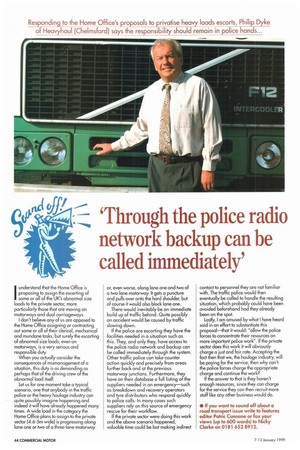'Through the police radio network backup can be called immediately'
Page 46

If you've noticed an error in this article please click here to report it so we can fix it.
Iunderstand that the Home Office is proposing to assign the escorting of some or all of the UK's abnormal size loads to the private sector, more particularly those that are moving on motorways and dual carriageways.
I don't believe any of us are opposed to the Home Office assigning or contracting out some or all of their clerical, mechanical and mundane tasks, but surely the escorting of abnormal size loads, even on motorways, is a very serious and responsible duty.
When you actually consider the consequences of mismanagement of a situation, this duty is as demanding as perhaps that of the driving crew of the abnormal load itself.
Let us for one moment take a typical scenario, one that anybody in the traffic police or the heavy haulage industry can quite possibly imagine happening and indeed it will have already happened many times. A wide load in the category the Home Office plans to assign to the private sector (4.6-5m wide) is progressing along lane one or two of a three-lane motorway or even worse, along lane one and two of a two-lane motorway. It gets a puncture and pulls over onto the hard shoulder, but of course it would also block lane one.
There would inevitably be an immediate build up of traffic behind. Quite possibly an accident would be caused by traffic slowing down. If the police are escorting they have the facilities needed in a situation such as this. They, and only they, have access to the police radio network and backup can be called immediately through the system. Other traffic police can take counter action quickly and precisely from areas further back and at the previous motorway junctions Furthermore, they have on their database a full listing of the suppliers needed in an emergency—such as breakdown and recovery operators and lyre distributors who respond quickly to police calls. In many cases such suppliers rely on this source of emergency rescue for their workflow.
If the private sector were doing this work and the above scenario happened, valuable time could be lost making indirect contact to personnel they are not familiar with. The traffic police would then eventually be called to handle the resulting situation, which probably could have been avoided beforehand had they already been on the spot.
Lastly, I am amused by what I have heard said in an effort to substantiate this proposal—that it would: "allow the police forces to concentrate their resources on more important police work". If the private sector does this work it will obviously charge a just and fair rate. Accepting the fact then that we, the haulage industry, will be paying for the service, then why can't the police forces charge the appropriate charge and continue the work2
If the answer to that is they haven't enough resources, since they can charge for the service they can then recruit more staff like any other business would do.
• If you want to sound off about a road transport issue write to features editor Patric Cunnane or fax your views (up to 600 words) to Nicky Clarke on 0181 652 8912.
































































































